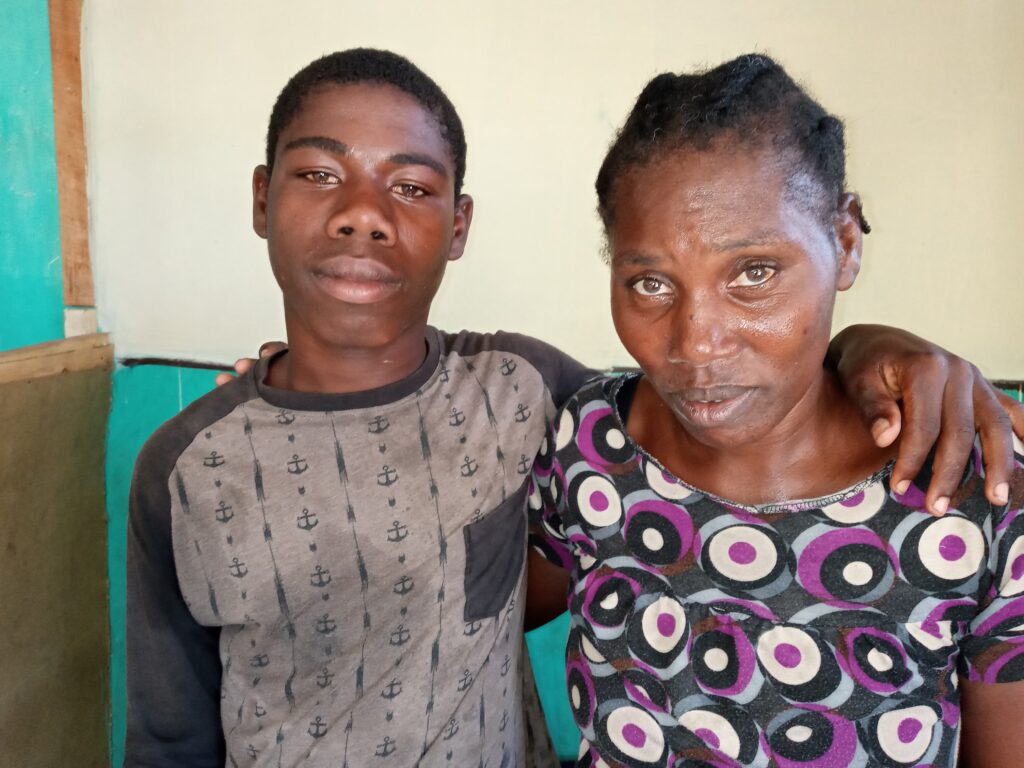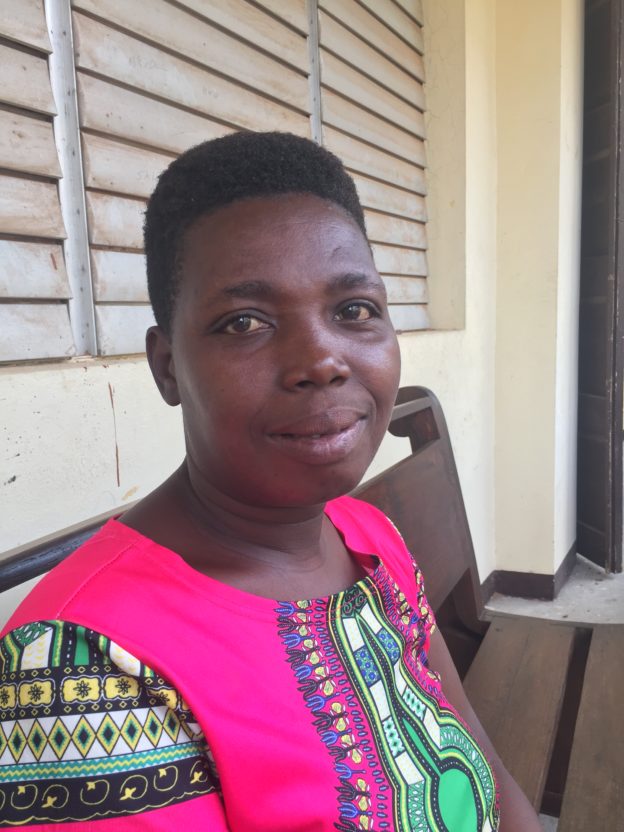Since it was established in 2007, the CLM program has worked exclusively in the countryside. That was consistent with Fonkoze’s original focus on rural areas, but also with the history of CLM’s parent program, the graduation program developed by BRAC, in Bangladesh. It also focused initially on the rural poor.
This focus had consequences for the program’s design. Its selection process depends on a fundamental fact about rural areas: neighbors know one another well. The enterprises CLM helps families develop have been principally the sort that work in rural areas: animal husbandry, small commerce, and farming. And those are just two of the ways the program has reflected its rural focus.
But Fonkoze knows – as BRAC knew as well – that extreme poverty exists in cities, too. So Fonkoze is now piloting an urban version of the program in Jeremi, in southwestern Haiti. After six days of training ended on Saturday, 200 new families joined the program from five poor, seaside neighborhoods.
There are some differences in how the program works. On one hand, though the selection process involved community members in its first steps, it was not a full-blown wealth ranking process. On the other, Fonkoze ending up transferring investment capital for small commerce, rather than assets. There are other differences as well, including a special array of challenges around home repair and land rights.
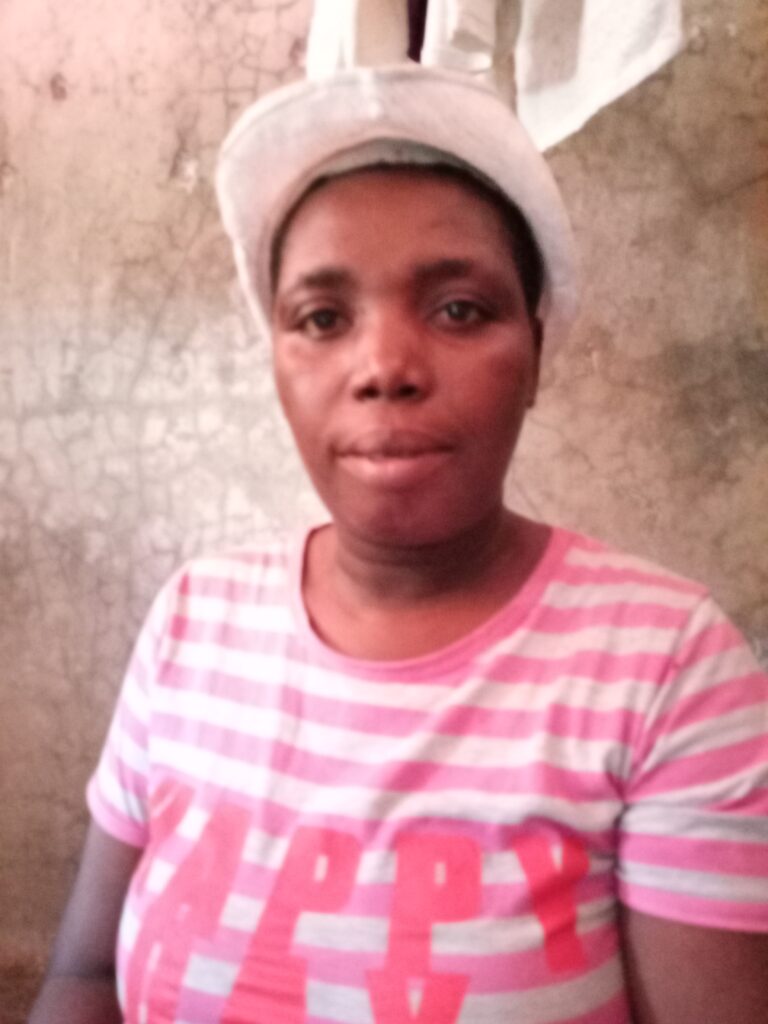
Lancie Vixima lives in Kamanyòl. She has eight children, but just five still live with her and the father of the youngest four. The oldest of the five has been raised by her partner as one of his own children. She’s a 14-year-old deaf girl who now has her own baby. Since the baby’s father provides no support, Lancie is responsible for her grandchild, too.
Lancie’s husband used to fish, and she sold used sneakers and schoolbags. But the husband suffered a hernia about a year ago, and had to give up his work. That put more pressure on Lancie’s commerce than it could bear. The expenses involved in getting him care, combined with his inability to contribute, ate up the capital her business depended on. It no longer exists.
To earn the little bit of income she needs to feed her kids, Lancie shells peanuts for women who sell them roasted. A typical job can involve as many as ten cans of nuts and takes her two-three days. She’s generally paid 150-200 gourds, or about $2. That’s enough money to buy 3-4 cups of rice if that is all she buys. But as big as her household is, it doesn’t go far. And the work is difficult for her because she has only one good arm. The other is very little help.
She was excited to get started in the program. “They taught us a lot about managing a commerce.” And she knows what she wants to do with the money she will earn once she starts. “If I make 500 gourds, I need to save 50. And I need to start sending my kids to school again. Four of them used to go, but I didn’t have the money to send them last year.”
Lancie is excited about some of the progress she has made in the program’s first ten months. She had been, practically speaking, homeless because she couldn’t stay in her own home. She and her children were living in borrowed space in her sister-in-law’s home.
In contrast to many of the members from Jeremi, this is NOT because she doesn’t own a home. Lancie owns a well-built home, given to her by a US-based charitable organization with operations in Jeremi, and the land it’s on was given to her as well. But the house had no roof. Not that some or most of its roofing material was in poor condition, but that its roof was gone, lost because of a series of storms. With the investment that the CLM program helped her make in roofing material, the new roof is up and she and the children are back in their home.
Her struggle to develop more income has had more mixed results so far. She initially invested 1500 gourds, which is now less than $15, in a komès epis, or spice business. She sold leeks, garlic, and onions, important seasonings in Haitian cooking, and she started off well, quickly increasing her investment to 2000 gourds. But the business soon withered away because she counted on it to buy all the food her household needs.
She wants to establish a business again. And she’s in a better position to do so now that she’s in her own home. She likes komès epis, and she’d like to return to that. She feels comfortable with it. But she’s like to add a business selling charcoal. Charcoal from wood is the principal cooking fuel in Haiti’s cities, and so it sells very reliably. She feels that an investment of 3000 gourds would get both businesses up and running.
Under some circumstances, she would be able to access the capital by borrowing it from her savings and loan association. All the program members in Jeremy are part of VSLAs.
But two things argue against that. On one hand, she hasn’t been making regular weekly contributions. “If I have 100 gourds, I am going to use it to feed my children.” And not, by implication, to add to her savings.This is a sharp contrast to the lesson she said she learned from the initial CLM training she attended. On the other, she is simply afraid to borrow money. “I have too many kids on my hands.” Lancie still speaks like someone who feels overwhelmed by the challenges she faces.
She does, however, have some money in her savings account, and she’ll need to figure with her case manager how she can use it best.
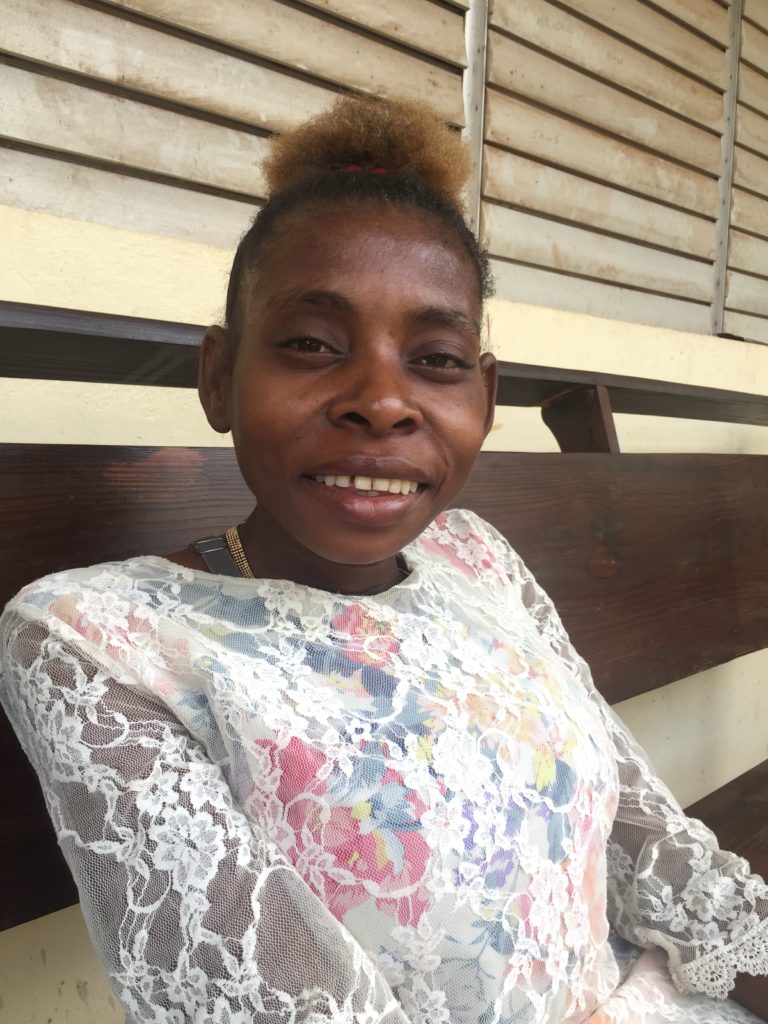
Margalitha Lissaint too is still struggling after 10 months in the program. She’s 28-year-old a single mother of just one baby. The child’s father abandoned them before Margalitha gave birth. A tiny woman – well under five feet tall – with a back bent by scoliosis, Margalitha just recently moved with her baby out of her mother’s home.
Even before her child was born, Margalitha was struggling to support herself. She tried businesses selling prepared meals or fritay, fried snacks, along one of the alleys that runs through her neighborhood. But she couldn’t keep it business going because she would sell on credit and then her customers wouldn’t pay. “They’d swear at me when I tried to collect.” Margalitha knows that she shouldn’t have given credit in the first place, but in a poor neighborhood like hers, refusing isn’t easy. “The people who ask you are your neighbors, and when you’re hungry too, you can’t say ‘No.’”
She’s anxious to use the resources CLM will give her to start her business again. “I won’t be able to sell on credit anymore. I have a child I’m responsible for.” She wants to go back to selling fritay, but also basic groceries. And she’d like to add a side business selling used clothes. Her mother is in the CLM program as well, and she thinks she can count on her help, especially when she needs a babysitter.
And she’ll need the help. She made it into secondary school before her mother’s inability to pay forced her to give up her studies, and she now hopes that being part of CLM will enable her to return.
“I need to support my baby, but I need to save money, too. That way, if the business shrinks I’ll have something I can invest to make it grow again.”
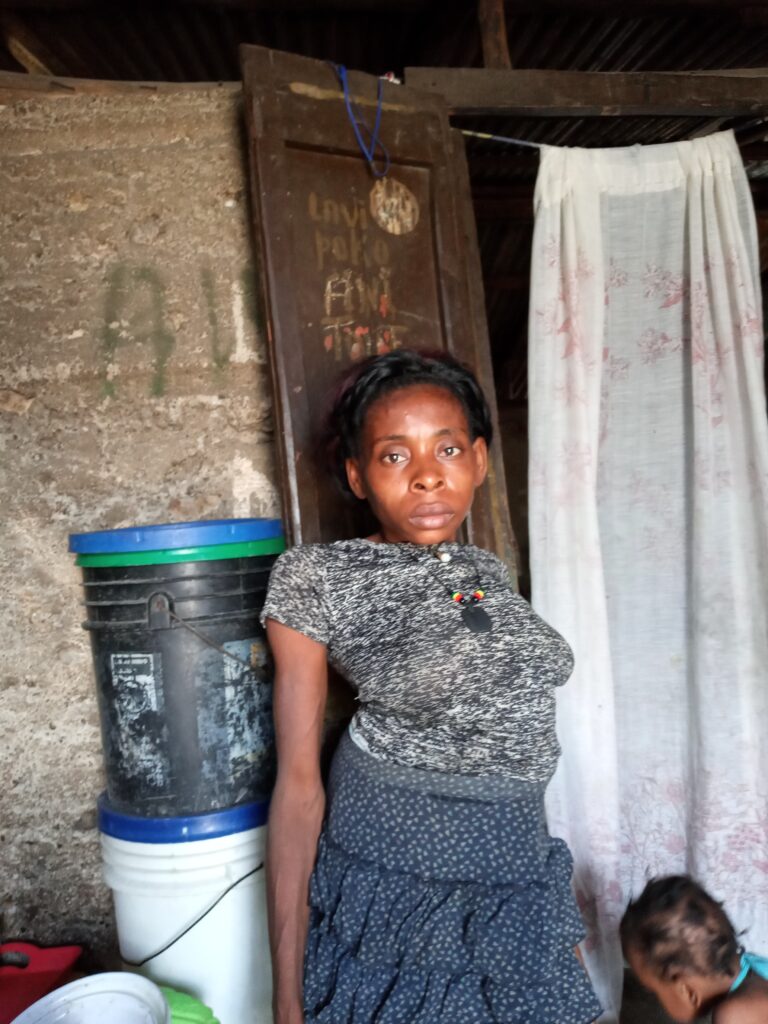
Margalitha did re-start her fritay business shortly after joining the program. It was starting to progress, but then she ran into trouble. Her baby got sick. Between doctors’ appointments, lab work, and medication, she quickly burned through everything she had. She now counts on her mother, who is also a CLM member, to keep her and the baby fed.
She wants to get back into business, but with all the difficulties she’s faced selling fritay, she’d now wants to try something else. She’d like to take some of the money in her savings account and invest in sandals.
The two live with her mother once again, too, but that situation may be temporary. She is building her own small, one-room home on land that her family controls across a small yard from her mother’s house.
The situation is unusual, however, and may be fragile. She is building the entire home out of roofing tin. Not just the roof, but the walls as well. It is striking to see the bright, new corrugated-aluminum walls reflect the sun just as the roof does. Using the roofing that way leaves her with a much less stable structure than cinder blocks and concrete would, and it means that the home will be especially hot during the days, but it is much less expensive. And she’s afraid to make a more substantial investment because her family’s claim to the land is, apparently, in dispute. She may need her case manager’s help to figure out how to secure her right to the land.
In the meantime, she has already earned some extra money by renting a corner of the still-unfinished home to another single mother.
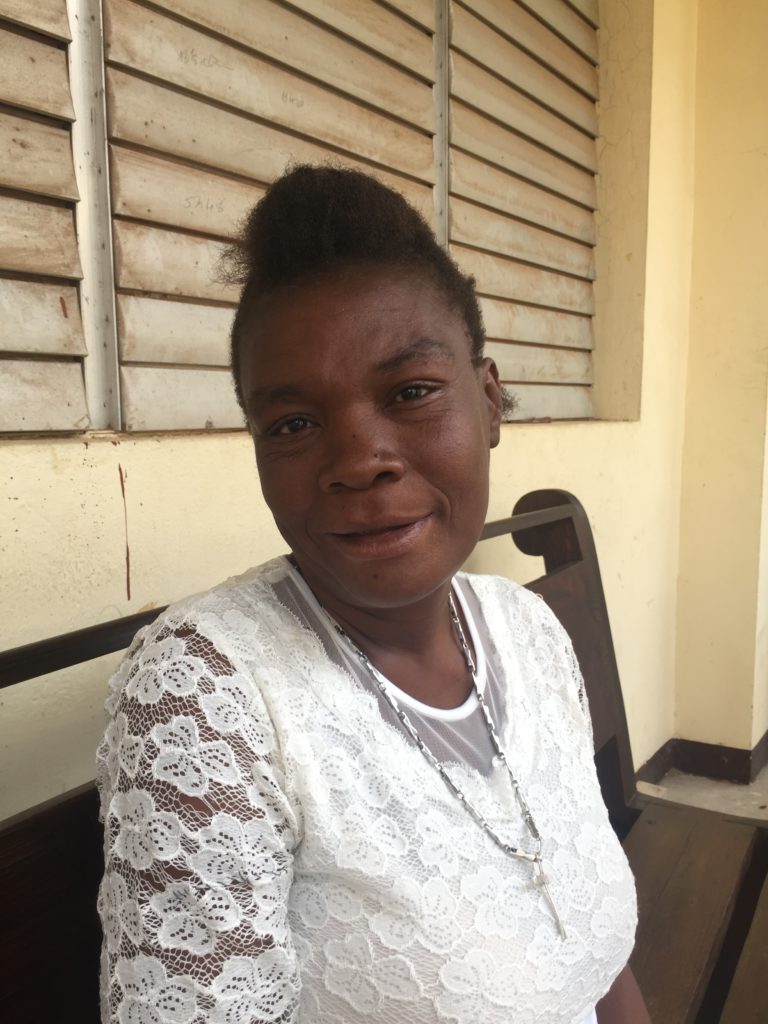
Meloude St. Vil and her husband Nicola live with their six children, ages five to 13, in a neighborhood called Dèyè Distriyèl. Her husband does whatever odd jobs he can find, often scavenging scraps of iron that he can sell to recyclers. Meloude sometimes finds someone willing to give her their laundry to do. Neither has any regular income.
Until Hurricane Matthew passed through Jeremi in 2016, the family lived in a small house with a solid roof, but the hurricane’s category-five winds blew the house down. She and her husband collected what they could of the roofing material and used it to put up a new set of make-shift walls. That lasted until an unexpected windstorm blew the house apart Friday night.
She and Nicola support their kids with his little jobs and her occasional laundry, but it’s gotten much harder. “More people are doing those things now.”
She’s started to work out her plan to establish a more regular income. She wants to get up early in the morning and sell prepared breakfasts. She figures that she can use the business to feed her children before they go to school. She’ll finish selling early in the day, and then move to the market. She’ll sell basic groceries there.
She thinks that, combined, the two business can help her out. She needs to feed her children, but knows that it’s also important to save. “I have to put 50 gourds somewhere now and again so I’ll have something if the house needs repairs or if one of the kids gets sick.”
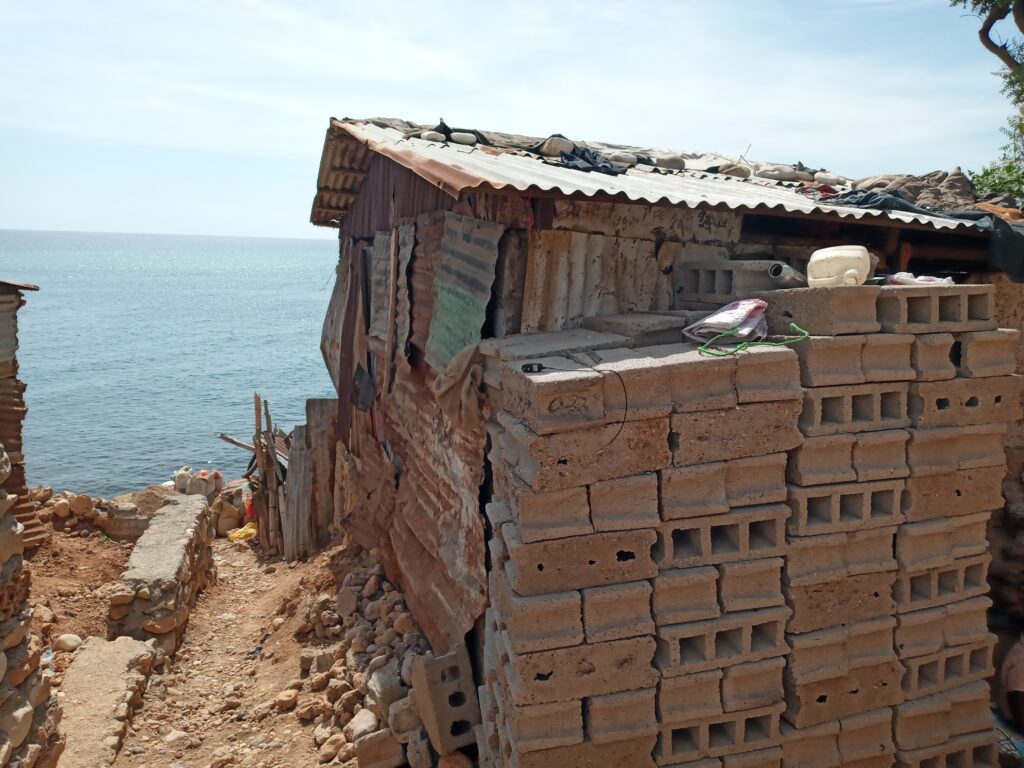
Ten months into the program, Meloude and Nicola are glad to be working to rebuild their home once again. Because she is part of the CLM program, she has more resources to invest than she’s ever had before. Though the house is still a temporary structure, made mostly of roofing tin, the couple has begun assembling the blocks they will need to replace the walls. They have purchased most of the blocks they’ll need, but they will need more money to buy the cement.
Meloude feels her life has changed since she joined the CLM program, and not only because she can hope to repair her home. “M pat konn manyen lajan chak mwa.” That means that her hands didn’t touch money every month. It is hard to believe that she means it absolutely literally, but it is, nonetheless, a powerful way to talk about the difference in her life. She has money to manage, to make decisions about. She no longer must live hand-directly-to-mouth.
She used to sell prepared meals, buying the ingredients in the morning on credit and then paying the merchants that same day. But if her food didn’t sell well, or if too many of her clients paid with credit themselves, she could find herself unable to pay what she owed. She’d have to face the merchants, and ask for their patience. And in the meantime, her own business would be blocked until she could clear the debt.
The capital that the CLM program made available to her made it possible to re-establish the business with her own money. Because she’s not borrowing any more, she can keep things going through the inevitable dips that her business will go through. As long as she manages what she has, she can sell any day that she doesn’t have something else she needs to do.
But most of the money CLM provided the family has gone into her husband’s business, which is now flourishing. He buys scrap metal of all sorts and sells it to recyclers in Pòtoprens. It took some time to build up his capital from what Meloude initially gave him, but he can now buy 15,000 – 20,000 gourds worth each time he ships.
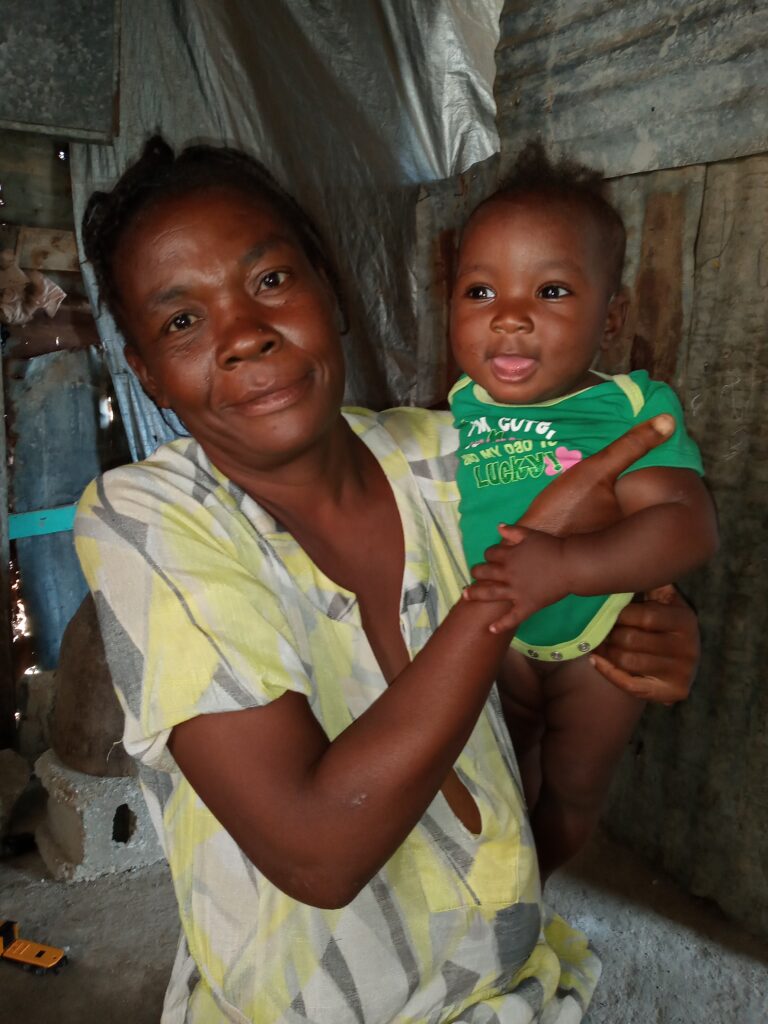
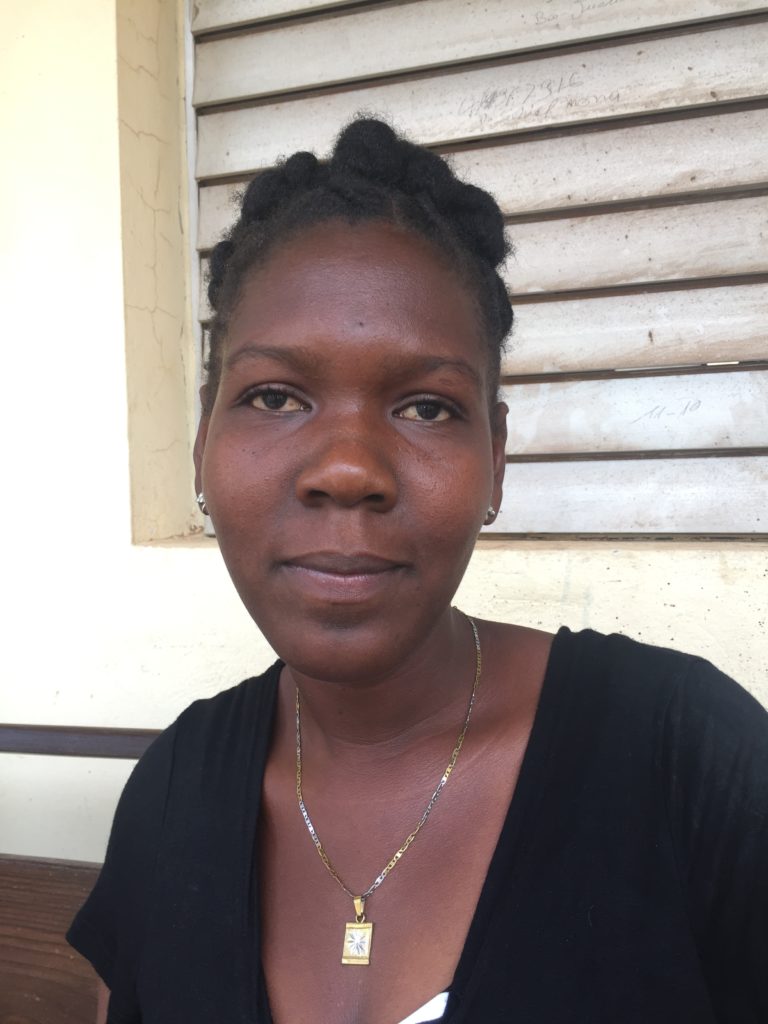
Sonya Etienne is succeeding quickly. She lives with her husband Gary and their two children, ages four and nine, in Nan Site.
The family previously depended entirely on Sonya’s business selling charcoal for cooking. Gary is willing to work hard, but he has no skills. He used to depend on finding masons willing to take him as an assistant, carrying mortar, rocks, cement, or water, whatever they would pay him to do. But the work was irregular. He could go days at a time without finding anything. He eventually got sick, and was unable to work at all. He’s recovered, though, and now makes cinder blocks with a shovel and a mold. The work is much more regular. Some of the progress the couple has made comes from his improved health.
Sonya has a lot of experience with her charcoal business. She buys a sack or two and divide it into bags that give someone what they might need for just a day or two. Sales are reliably profitable even if there are occasional small losses. “Sometimes you open a sack and most of the charcoal has been ground down into pieces that are too small. Then you lose money on that sack.”
Paying for her husband’s healthcare while feeding the household without his help proved to be too much for her business, and it disappeared. She was excited to get started again using the capital that the CLM program made available.
She was also happy with the lessons about small commerce that her CLM training provided. She learned some things about avoiding counterfeit money that she believes will be valuable. But there was more, as well. “They said you should sell what you know, and I know charcoal.” A charcoal business is important to her because it means that she always has some to cook her own food.
She wanted to add a side business selling cookies and crackers to schoolkids and another selling cellphone minutes. But other opportunities came her way. Once she had re-established her charcoal business, she started buying gasoline in five-gallon jugs and selling it by soft-drink bottles, half-gallons, and gallons to motorcycle drivers. They are willing to pay a premium to avoid having to go all the way across town to get into line at a gas station.
She also started a business selling ice, but she didn’t start it herself. Her ten-year-old son Widmaël did. Someone gave him 100 gourds, which is less than a dollar, and he bought a small block of ice, which he carried around until he sold it in small chunks. Sonya explains, “He never spent any of the money he made. He just kept buying more and more ice.” So she bought a thermos chest and started buying in larger quantities. She would sell to people who came to her looking for ice, but Widmaël would still make most of the sales by taking a small amount at a time and walking around with it. When school starts, he’ll go in the morning. “Ice sells better in the afternoon sun anyway,” Sonya explains. She still plans to sell cookies and crackers, but is waiting for school to reopen to get started.
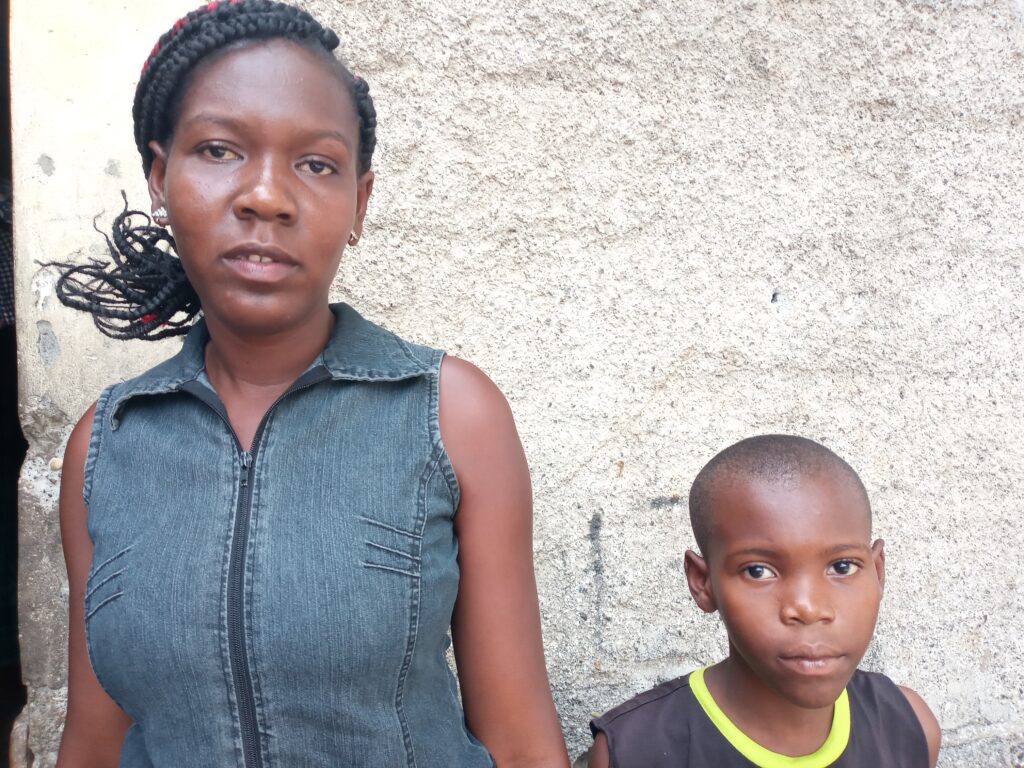
Looking back after ten months, Sonya thinks more about the Haitian proverbs they have discussed in her CLM trainings than about any particular skills she’s learned.
“Hang up your bag somewhere you can reach it.”
“If they pour water for you, you should be ready to scrub your own body.”
This second proverb was especially meaningful because, she says, “there is a level of effort I would not be putting into to things” if I weren’t in the program.
She believes in saving, and has been using a local savings structure for years. Someone with means collects savings every day: one Haitian dollar, which is five gourds, on the first day of the month, two on the second, three on the third, etc., all the way to the 30thor 31st. At the end of the month, you receive 450 Haitian dollars, or 2250 gourds minus a 50-gourd fee. If you miss payments, you get back what you have deposited, minus the same fee.
Savings are especially important because her home is a rental. She and her husband have been paying 10,000 gourds per year. That’s almost $110. It is much more money than they can earn in a single shot. Their lease is up in September, and the landlord has already warned them that the rent will increase to 12,500 for the coming year.
And Sonya was excited to report that she is on the way to solving her rental problem. She and her husband Gary were able to make a downpayment towards the purchase of a small piece of land not far from the neighborhood where they now live. It will eventually cost 90,000 gourds, but they are well on their way. There is already a shack on the land, and they will need to replace it, but they decided to focus on installing a latrine first. Once the latrine is in, they feel they can move. Replacing the shack can wait.
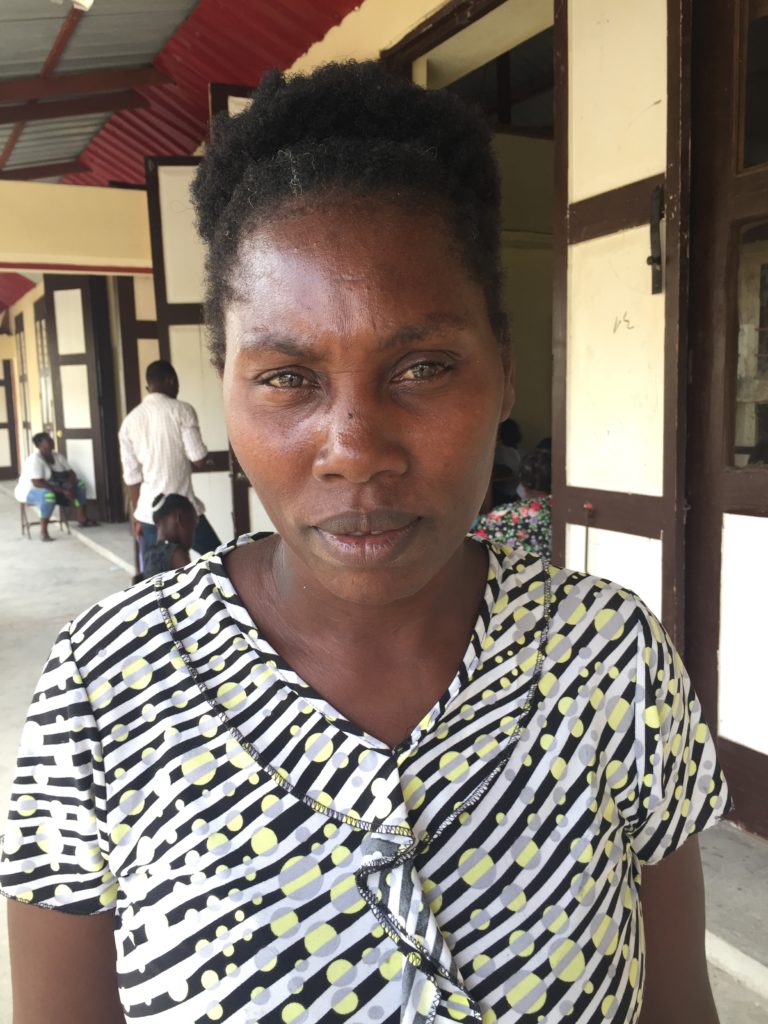
Marie Milise Mistaire lives in Lapwent. She’s had nine children with six different men, but she lost one of the kids. She’s been alone with her kids since the last man died. Six of the children live with her. Her oldest girl has been living with her uncle out in the countryside ever since the younger woman’s stepmother, whom she had been living with, put her out of the house. Her second daughter moved out to be with a boyfriend, but she now wants to moved back in with her mother, pregnant. The boyfriend refuses to help her.
Marie also has a nine-year-old with severe disabilities who lives with a sort of foster family. The family lives near a school for handicapped children, and they took a liking to the boy. Marie pays for the school, but they take care of the boy for her.
She used to make a pretty good living selling fish. She would buy a big thermos-chest full from local fishermen and take it for sale to the market. On some days, she would see that the market was too flooded with fish. Then she would separate her merchandise into small loads and carry them on her head through the residential areas of town. It might take three or four trips to sell a full day’s load, but she would usually sell out. If she had any she couldn’t sell, she would dry it out and sell it later. She was successful. “I could put aside 500 gourds of the profit every day, even after I took out what I needed for my family.”
But taking care of her late husband before he died ate up all her capital. She was forced to turn to friends for charity.
She was excited to be part of the program, and knew she wanted to go back into the fish business. “I will do what I know.” And she was confident she would succeed. “You don’t buy something to sell it at a loss.” She was thinking from the start of building up savings. “When the CLM team sees my savings account, they’ll know I worked hard. I think I can come in first place for savings.”
She re-started her fish business with 2500 gourds of the capital that the CLM program made available, and has built it up to 4000 gourds. She makes 500 to 1000 gourds of profit in a day. She tries first to sell her entire load to a restaurant, but if she cannot, she walks it through the street selling individuals as much or as little as they want. “Even if it’s just 25 gourds, you cannot tell them you won’t make a sale.” If she sells out quickly, she can make a second trip.
When she joined the program, she was thinking of all the things her house needed, things she felt the lack of, like a bed, chairs. “When they first came to my house, they had to sit on my water jugs. I want to buy chairs so I can offer them a place to sit. I had a big pile of dirty laundry because I didn’t have the money to buy soap. If they see that my life doesn’t change, they’ll think that their investment was wasted.”
And her life has changed. “I didn’t have cups we could drink water from. I didn’t have a basin to do laundry.” She proudly shows off some of the household items her business has enabled her to buy.
But as she talks about her progress, she smiles and makes a pun. “Fòk ou jere. Jeremi gen ‘jere’ ladann.” “Jere” means “to manage.” She says that “You have to be able to manage. Jeremy has managing as part of it.”
